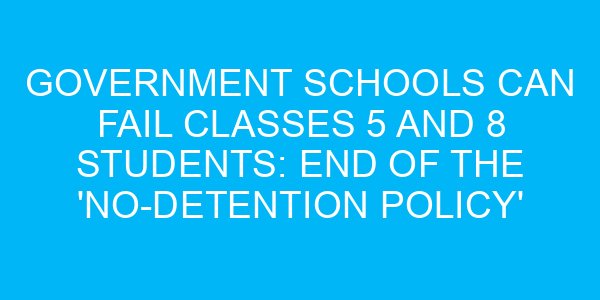The central government has officially scrapped the ‘no-detention policy’ for Classes 5 and 8, marking a significant shift in India’s education system. Under the new rule, students in these grades who fail their annual exams can now be held back and required to repeat the year, but only after being given a second chance to pass.
Key Highlights of the Policy Change
- ‘No-Detention Policy’ Abolished:
- Students failing year-end exams in Classes 5 and 8 may now repeat the grade.
- This applies to over 3,000 central government-run schools, including Kendriya Vidyalayas, Navodaya Vidyalayas, and Sainik Schools.
- Second Exam Chance:
- Students who fail their initial exams will have a chance to retake them within two months.
- Failure in the re-exam will result in retention in the same grade.
- Support for Struggling Students:
- Teachers will identify learning gaps and provide additional guidance to help students improve.
Why the Change?
The Union Education Ministry’s decision is aimed at improving learning outcomes among students. By removing automatic promotion, the government hopes to foster accountability, ensure academic readiness, and prevent learning deficiencies from accumulating as students advance through grades.
Impact on Education Policy
This decision reverses the 2019 amendment to the Right to Education (RTE) Act, which had allowed states the flexibility to decide on detention policies.
- Background of the No-Detention Policy:
- Introduced to reduce dropout rates, this policy ensured automatic promotion up to Class 8.
- Critics argue it led to a decline in learning outcomes as students progressed without mastering basic skills.
- Current State Decisions:
- 16 states and 2 union territories have already abolished the policy.
- Remaining states can choose whether to implement or continue the policy.
Support for Retained Students
The government has clarified that no student will be expelled before completing elementary education. For those held back, comprehensive support mechanisms will be implemented:
- Personalized Teacher Support:
- Teachers will guide retained students and their parents, addressing specific learning gaps.
- Tailored interventions and specialized inputs will be provided to improve understanding.
- Focus on Learning Outcomes:
- Regular assessments and progress tracking will ensure students are equipped for promotion in the future.
What This Means for Students and Parents
- Greater Accountability:
- Students will need to focus on achieving minimum academic standards to progress.
- Improved Learning:
- With teachers addressing foundational gaps, students will gain better preparation for higher classes.
- Parental Involvement:
- Parents will play a crucial role in supporting their children’s learning during retention periods.
Key Takeaways for Competitive Exams
- Importance of RTE Amendments:
- Be aware of the evolution of India’s Right to Education policies and their implications.
- Debate on Education Policies:
- Understand both the benefits and criticisms of the no-detention policy.
- State vs. Central Decision-Making:
- The division of responsibilities between state governments and the central government in education is a critical topic.
- Focus on Learning Outcomes:
- The shift reflects the global trend of prioritizing quality education over quantity.
The abolition of the no-detention policy represents a step toward improving academic standards in India. It emphasizes a balance between support for struggling students and ensuring that learning gaps are addressed before promotion. This change could significantly impact the future of India’s education system.



